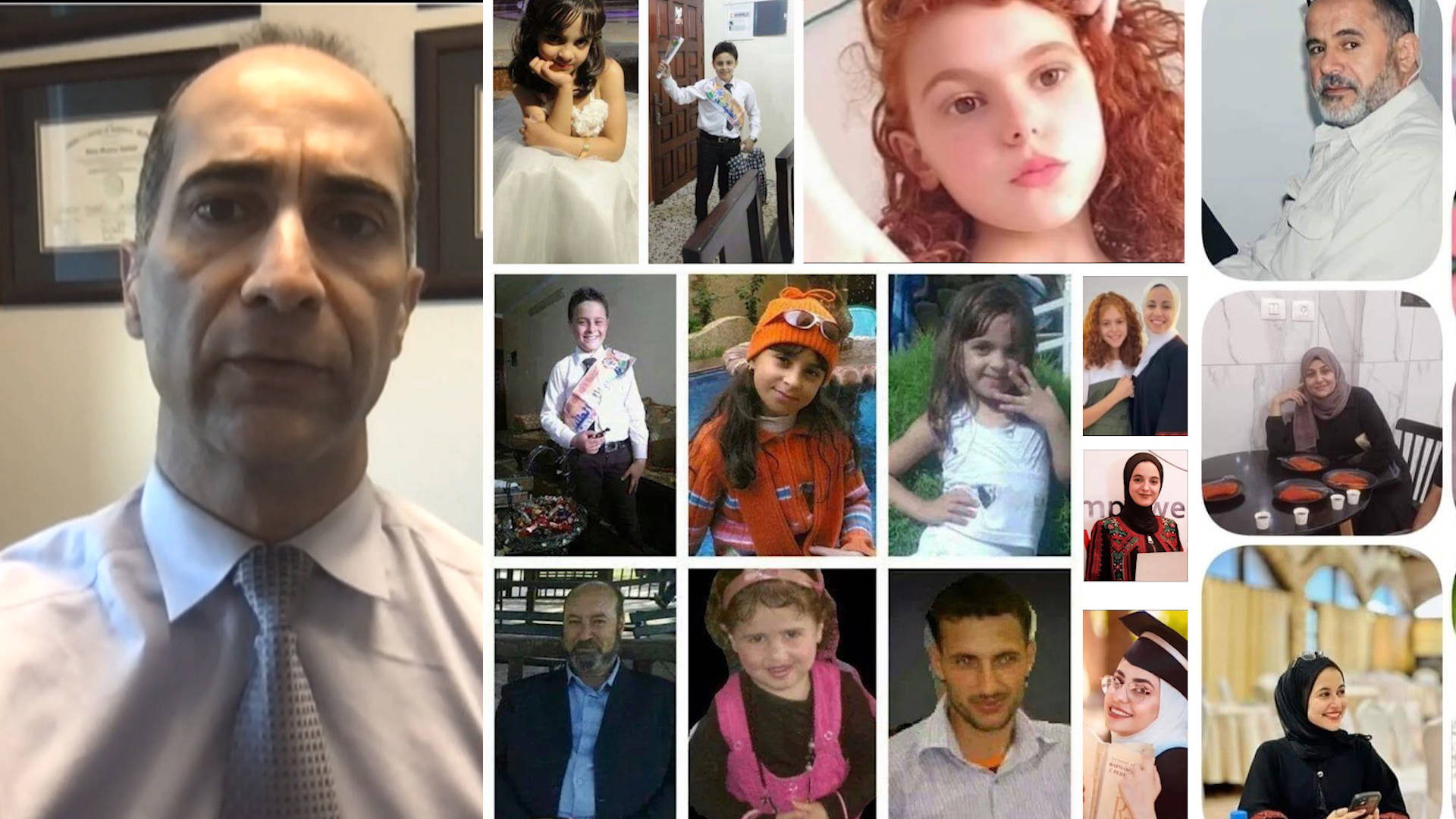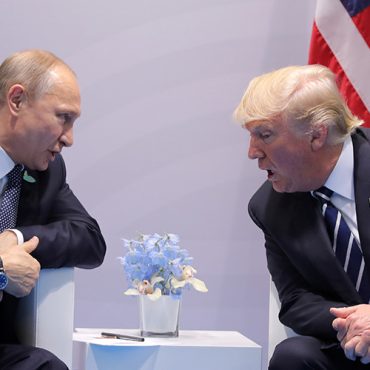This is a rush transcript. Copy may not be in its final form.
NERMEEN SHAIKH: This is Democracy Now!, democracynow.org, The War and Peace Report. I’m Nermeen Shaikh.
Before U.S. Secretary of State Antony Blinken left for his fifth Middle East trip since October 7th, he held a roundtable meeting Thursday to discuss the situation in Gaza with a number of Palestinian Americans. But some of them refused to attend, in protest against the Biden administration’s ongoing support for Israel’s assault on Gaza.
We’re joined now by one of those who refused. Dr. Tariq Haddad is a cardiologist and member of the Virginia Coalition for Human Rights, who grew up in Gaza. He laid out his reasoning in a 12-page letter to Blinken. Included in Dr. Haddad’s letter were pictures of his family members. One of Blinken’s staff reportedly made sure to print the letter in color. Dr. Tariq Haddad joins us now from Falls Church, Virginia.
Dr. Tariq Haddad, welcome to Democracy Now! Our condolences to you for the many family members of yours who have been killed in Gaza. If you could begin by talking about what you know of what happened in Gaza to your family members, and then explain this invitation that you received for a meeting with Secretary of State Antony Blinken and why you declined to attend?
DR. TARIQ HADDAD: Thank you. Thank you for having me. And I appreciate the condolences.
Yeah, I think some context is necessary here to understand why I turned this invitation down. So, I have hundreds of family members in Gaza, both sides of my family, both in the town of Khan Younis and the Gaza City. I’ve had about a hundred family members at this point who have been killed, including physicians, pharmacists, lawyers, engineers, dozens and dozens of children, multiple small babies. I can’t tell all their stories, but I just want to tell a few just for the audience.
October 25th, 10 members of my family, all three generations of one side of my family, were all killed. My cousin Jamal El-Farra, his son, who is a physician, Dr. Tawfiq El-Farra, his wife who was pregnant, two of their beautiful daughters, Reem and Hala, Jamal’s brother Esam, wife Semad, and their daughters, Rusul, Tuqa and Nadian, all, multiple generations all killed in one Israeli missile strike. Tuqa, one of the younger women in the family, her wedding date was the day she was killed. They were all from modest means. They actually built — the three brothers built their home themselves, ironically, the same home that the Israeli strikes destroyed.
Another day, a couple days later, my cousins Hatem and Aziz El-Farra from Khan Younis, who lived literally 20 yards from where I grew up, were killed along with 14 other members of their family, seven of their children. Aziz was actually a pharmacist, and Hatem was just an incredible community figure who always had a smile on his face, always was available to help anybody who needed it. The day before he was killed, Hatem had just gone up to my uncle and asked if he could house five families who were made homeless by the Israeli missile strikes, in our grandparents’ house.
One child, one child out of that whole three generations, survived, Hamza. He had an amputation, was in the hospital. He woke up to find out his siblings, his parents, his uncles and his aunts, his grandparents all had died. Excuse me. And then he died himself in the next day from the trauma injuries from the Israeli attacks, because there wasn’t adequate medical care to keep him alive.
A couple of days after that, November 2nd, my cousins Hani, Huda and Wafaa El-Haddad, all siblings, were killed in Gaza City along with my cousin Hani’s Croatian wife and my aunt. Huda and Wafaa were teachers. Hani was an interior decorator. My cousin Hani initially survived with — as a physician, I can tell you it was a fairly minor leg injury, but then he bled to death the next day, because he had no access to any functional medical facility, since they had all been bombed and destroyed by the Israeli attacks. Hani’s brother Wael survived and then had to witness the horror of seeing his mother buried from the waist up in the rubble, dead. And he saw his sister Wafa shredded into pieces. And this, you know, they’re messaging me and telling me.
My other cousin, Nael, who I grew up with and played with as a kid, literally had to bury all his family members in a makeshift grave, because he couldn’t even access a cemetery. And he’s been going 24 hours at a time with no food or water.
Even those in my family who actually fled what was thought to be dangerous areas to safe areas have been targeted. One of my cousins, Samar El-Farra, died in a refugee camp in Rafah around the time she had completed her doctorate for her Ph.D. And we were about to congratulate her on that doctorate when she was killed.
There are family members who have died from a lack of medical care, an inability to access medical care. One of my cousins, Abdulrahman El-Farra, died because he was unable to reach a functional hospital after he was injured. Four of my family members got killed in an Israeli bombing of their car while they were, ironically, trying to go to the Gaza European Hospital for shelter. And then, a few weeks ago, Sabri El-Farra, one of my cousins, died with seven of his sons. And then, most recently, just a few days ago, a baby in our family, Saber El-Farra, who was 20 days old, froze to death, died from hypothermia in the refugee camp that his family was in. And this is after — this 20-[day]-old just froze to death after nine of his siblings and his father were murdered by the Israeli military strikes a few weeks before.
The ones — the people in my family who have not been killed, arguably, are suffering a fate worse than death. Hundreds of my family are displaced. Not a single one of them is able to stay in their home. All their homes are either damaged or destroyed. One of my family members had to give birth on the rubble of her home that was destroyed, and did not even have clothes to put on her baby. Famine is common. Every one of my family members has mentioned it. They have no access to clean water. They’ve had to recycle water because there’s no access to clean water. And they’ve had dysentery and gastrointestinal illnesses. Famine. One of my cousins messages me all the time saying he’s gone 24 hours without food.
So, to answer your question, knowing all this and knowing what I’ve gone through week after week, month after month, checking every morning to see who’s alive, who’s dead, who’s suffered, who can we help, and as the dead rose to a hundred in my family to 15,000 children all across Gaza, to 30,000 civilians, as I saw the famine happen, I just kept looking for evidence that our government actually cares about the lives of my family. And I saw none. I kept waiting for a ceasefire, that Secretary Blinken had access, has the ability to do, and he refused to do it. I kept waiting for a United Nations resolution to call for a ceasefire, which the United States continued to veto. I kept waiting for something, and all I saw was the opposite. I saw our U.S. strategic Middle Eastern military reserve being used to replenish the Israeli ammunitions for this genocide. I saw, cruelly, just a few days ago, the withdrawal of funding for the United Nations, that was supplying military [sic] assistance to these over 2 million people that are going through famine.
So, getting back to your original question, I sort of — I wrote this letter to Secretary Blinken because I wanted him to see me and see Palestinians as human beings, not as some part of a political game or some sort of, you know, blame game. I wanted him to see us for who we were as human beings. And I wanted him to put himself in my shoes and ask himself, if he saw his family getting killed day after day, month after month, as a direct result of the government’s policies, and he knew that somebody in that government could have done something to prevent those 100 people from dying, the suffering of the remaining hundreds of people, how could you sit in a room, given three minutes to face that person, and face them, knowing that that person has been directly responsible for the death of your family and all the suffering that your family has seen, and do so simply as part of a political grandstanding? And that’s why I just ethically could not be there, because actions speak louder than words. And I just wanted him to see us as human beings, to empathize, and not play politics and not play games.
NERMEEN SHAIKH: Dr. Tariq Haddad, thank you so much for joining us. And again, our condolences for the horrific — the horrors that your family has lived through in Gaza. Dr. Tariq Haddad, cardiologist and member of the Virginia Coalition for Human Rights who refused to attend a meeting in D.C. with Secretary of State Antony Blinken.
When we come back, we talk about starvation in Gaza with Alex de Waal. Back in a minute.
[break]
NERMEEN SHAIKH: Annie Lennox performing Billie Holiday’s “God Bless the Child.” On Sunday night, Annie Lennox called for a ceasefire at the end of her performance at the Grammys.











Post comments (0)